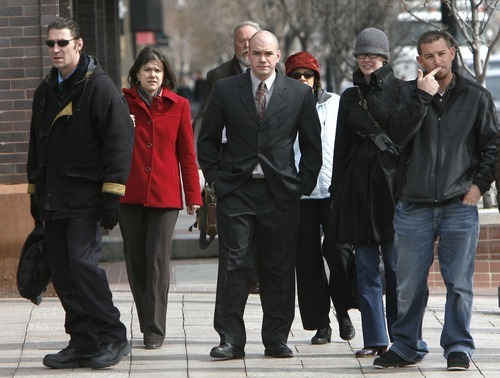This is an archived article that was published on sltrib.com in 2011, and information in the article may be outdated. It is provided only for personal research purposes and may not be reprinted.
Eight men and four women from a pool of 70 prospective jurors will decide environmental activist Tim DeChristopher's fate, and, upon seating them Monday evening, U.S. District Judge Dee Benson stressed to them that their job is not to determine whether it was appropriate to charge him for disrupting a federal oil and gas lease auction.
DeChristopher, 29, faces up to 10 years in prison for bidding on and winning 14 leases in Utah with no intention of paying the $1.8 million tab. He has said he believed the Dec. 19, 2008, auction was an illegal attempt by the outgoing Bush administration to rush development without proper environmental analysis and that he was standing up against climate change.
Benson previously ruled that he would not allow a "necessity defense" in which the defendant could argue that his motive was to prevent harm greater than his crime. On Monday, Benson reiterated the point to the 50 prospective jurors who made it to the final day of selection.
"It's the jury's job to be judges of the facts," Benson said, "not judges of the law."
He added that it would be a violation of jurors' oaths if they ruled based on anything besides the facts that come out in the courtroom.
"Juries are not empowered to set aside the law," he said.
That's a view with a counterpoint that most of the prospective jurors apparently learned about on their way into the courthouse. When Benson asked how many of them had been approached with pamphlets on the street, nearly all of them raised their hands. At one point Benson raised the pamphlet in question, and a part-time University of Utah law professor supporting DeChristopher's cause later identified it as something that the nonprofit Fully Informed Jury Association had been handing out. It advises jurors to consider whether a law is good and justly applied, and whether the punishment fits the crime.
"Despite what they're instructed by the court, [jurors] also have the right to evaluate the law based on their conscience," said Rebecca Hall, who teaches law and also works for the Utah Domestic Violence Council. "Otherwise, you could just have a judge."
Benson said he was not inclined to question prospective jurors about their views of the pamphlet. Vetting by the attorneys happened privately in the judge's chambers throughout the afternoon.
Before exiting the courtroom for one such conference, Benson informed the prospective jurors not to mingle with the 40 or so observers in the crowd, many of them DeChristopher supporters.
"I don't want to come back in here and you're all singing Kumbaya or something," he joked.
The case has attracted much media attention, and a questionnaire asked prospective jurors where they got their news and how much they had previously learned of the case. Other questions gauged their feelings about the oil and gas industry, federal drilling leases and environmental matters.
Tribune reporter Aaron Falk contributed to this story. —
Trial continues
The trial of Tim DeChristopher is scheduled to resume at 8:30 a.m., Tuesday at Salt Lake City's federal courthouse. —
Who's on the jury?
The jury is made up of a restaurant manager from South Ogden; a commercial pilot and flight instructor from Provo; a registered nurse from Sunset; a Department of Workforce Services collections supervisor from Salt Lake City; the director of nursing for a Logan care facility; an LDS Church employee; a Saratoga Springs woman who works for a trucking business; a Clinton man who works as an audio-visual producer for the LDS Church; an Eagle Mountain man who works for Layton Construction; a Salt Lake City student; a West Jordan man who works for a satellite company for mobile systems; and a Salt Lake City man who has worked for the Utah Department of Agriculture for 23 years.
The alternates are a Bountiful homemaker and a Paragonah man who works for a water-well service.



